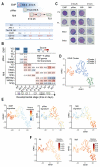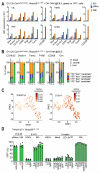Specification of tissue-resident macrophages during organogenesis
- PMID: 27492475
- PMCID: PMC5066309
- DOI: 10.1126/science.aaf4238
Specification of tissue-resident macrophages during organogenesis
Abstract
Tissue-resident macrophages support embryonic development and tissue homeostasis and repair. The mechanisms that control their differentiation remain unclear. We report here that erythro-myeloid progenitors in mice generate premacrophages (pMacs) that simultaneously colonize the whole embryo from embryonic day 9.5 in a chemokine-receptor-dependent manner. The core macrophage program initiated in pMacs is rapidly diversified as expression of transcriptional regulators becomes tissue-specific in early macrophages. This process appears essential for macrophage specification and maintenance, as inactivation of Id3 impairs the development of liver macrophages and results in selective Kupffer cell deficiency in adults. We propose that macrophage differentiation is an integral part of organogenesis, as colonization of organ anlagen by pMacs is followed by their specification into tissue macrophages, hereby generating the macrophage diversity observed in postnatal tissues.
Copyright © 2016, American Association for the Advancement of Science.
Figures








Comment in
-
Homegrown Macrophages.Immunity. 2016 Sep 20;45(3):468-470. doi: 10.1016/j.immuni.2016.09.006. Immunity. 2016. PMID: 27653599
References
-
- Schulz C, et al. A lineage of myeloid cells independent of Myb and hematopoietic stem cells. Science. 2012;336:86–90. - PubMed
Publication types
MeSH terms
Substances
Grants and funding
LinkOut - more resources
Full Text Sources
Other Literature Sources
Molecular Biology Databases

